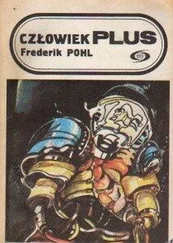Frederik Pohl - Man Plus
Здесь есть возможность читать онлайн «Frederik Pohl - Man Plus» весь текст электронной книги совершенно бесплатно (целиком полную версию без сокращений). В некоторых случаях можно слушать аудио, скачать через торрент в формате fb2 и присутствует краткое содержание. Год выпуска: 1976, ISBN: 1976, Издательство: Random House, Жанр: Фантастика и фэнтези, на английском языке. Описание произведения, (предисловие) а так же отзывы посетителей доступны на портале библиотеки ЛибКат.
- Название:Man Plus
- Автор:
- Издательство:Random House
- Жанр:
- Год:1976
- ISBN:0-394-48676-5
- Рейтинг книги:5 / 5. Голосов: 1
-
Избранное:Добавить в избранное
- Отзывы:
-
Ваша оценка:
- 100
- 1
- 2
- 3
- 4
- 5
Man Plus: краткое содержание, описание и аннотация
Предлагаем к чтению аннотацию, описание, краткое содержание или предисловие (зависит от того, что написал сам автор книги «Man Plus»). Если вы не нашли необходимую информацию о книге — напишите в комментариях, мы постараемся отыскать её.
Won Nebula Award for Best Novel in 1976.
Nominated for Hugo, Locus, and Campbell awards in 1977.
Man Plus — читать онлайн бесплатно полную книгу (весь текст) целиком
Ниже представлен текст книги, разбитый по страницам. Система сохранения места последней прочитанной страницы, позволяет с удобством читать онлайн бесплатно книгу «Man Plus», без необходимости каждый раз заново искать на чём Вы остановились. Поставьте закладку, и сможете в любой момент перейти на страницу, на которой закончили чтение.
Интервал:
Закладка:
Scanyon jerked the earpiece away and rubbed his ear. “What the hell happened?” he demanded. There was no answer from anyone to the rhetorical question, and gingerly he put the phone back. “I’m getting some kind of trouble signal,” he announced.
“We can send a man in, General,” the assistant security chief suggested. “There are two of our men in that car out in front of the house there.” The helicopter pickup had slid across the screen and settled at 1,800 feet over the Courthouse Square in the city of Tonka. The camera was set for infrared, and in the upper corner of the screen the broad dark band of the Ship Canal identified the edge of the town. A rectangle of darkness surrounded by the moving lights of cars just below the screen’s center point was the Courthouse Square, and Roger’s home was marked with a tracer star in red. The assistant reached up and touched the blob of light nearby to show the car. “We’re in voice contact with them, General,” he went on. “They didn’t see Colonel Torraway go in.”
Sulie stood up. “I don’t recommend it,” she said.
“Your recommendations aren’t too popular with me right now, Major Carpenter,” Scanyon snarled.
“All the same, General—” She stopped as Scanyon raised his hand.
From the speaker Dorrie’s voice came faintly: I want a cup of tea . And then Roger’s: Wouldn’t you rather I rnade you a drink? And her almost inaudible No .
“All the same,” Sulie spoke up, “he’s stable enough now. Don’t screw it up.”
“I can’t let him just sit out there! Who the hell knows what he’ll do next? You? ”
“You’ve got him spotted. I don’t think he’ll move, anyway, not for a while. Don Kayman’s not far from there and he’s a friend. Tell him to go get Roger.”
“Kayman’s not much of a combat specialist.”
“Is that what you want? If Roger doesn’t come back peacefully, exactly what are you going to do about it?”
Do you want some tea?
No… No, thank you.
“And turn that off,” Sulie added. “Leave the poor bastard a little privacy.”
Scanyon sat slowly back in his chair, patting the top of his desk with both hands at once, very gently. Then he picked up the phone and gave orders. “We’ll do it your way one more time, Major,” he said. “Not because I have much confidence. I just don’t have much choice, either. I can’t threaten you with anything. If this goes wrong again, I doubt I’ll be in a position to punish anybody. But I’m pretty sure somebody will.”
Telesforo Ramez said, “Sir, I understand your position, but I think this isn’t fair to Sulie. The simulation shows that he has to have a confrontation with his wife.”
“The point of a simulation, Dr. Ramez, is that it should tell you what’s going to happen before it happens.”
“Well, it also shows that Torraway is basically pretty stable in every other respect. He’ll handle this, General.”
Scanyon went back to patting his desk.
Ramez said, “He’s a complicated person. You’ve seen his Thematic Apperception Test patterns, General. He’s high in all the fundamental drives: achievement, affiliation — not quite so high in power, but still healthy. He’s not a manipulator. He’s introspective. He needs to work things out in his head. Those are the qualities you want, General. He’ll need all that. You can’t ask him to be one person here in Oklahoma and another person on Mars.”
“If I’m not mistaken,” the general said, “that’s what you promised me, with your behavior modification.”
“No, General,” the psychiatrist said patiently. “I only promised that if you gave him a reward like Sulie Carpenter he’d find it easier to reconcile himself to his problems with his wife. He has.”
“B-mod has its own dynamics, General,” Sulie put in. “You called me in pretty late.”
“What are you telling me?” Scanyon asked dangerously. “Is he going to crack up on Mars?”
“I hope not. The odds are as good as we know how to make them, General. He’s cleaned up a lot of old shit; you can see it in his latest TATs. But six days from now he’ll be gone, and I won’t be in his life any more. And that’s wrong. B-mod should never be cut off cold turkey. It should be phased out — a little less of me being around and then a little less than that until he’s had a chance to build up his defenses.”
The gentle patting on the desk was slower now, and Scanyon said, “It’s a little late to tell me that.”
Sulie shrugged, and did not speak.
Scanyon looked thoughtfully around the table. “All right. We’ve done all we can here tonight. You’re all dismissed until eight — no, make that ten in the morning. By then I expect every one of you to have a report, no more than three minutes long, on where your own area of responsibilities stands, and what we should do.”
Don Kayman got the message from a Tonka police patrol car. It swooshed up behind him, lights flashing and siren screaming, and pulled him over to order him to turn around and go back to Roger’s apartment.
He knocked on the door with some trepidation, unsure of what he would find. And when the door opened, with Roger’s gleaming eyes peering out from behind it, Kayman whispered a quick Hail Mary as he tried to look past Roger into the apartment — for what? For the dismembered body of Dorrie Torraway? For a shambles of destruction? But all he saw was Dorrie herself, huddled in a wing chair and obviously weeping. The sight almost pleased him, since he had been prepared for so much worse.
Roger came along with no argument. “Goodbye, Dorrie,” he said, and did not wait for an answer. He had trouble fitting himself into Don Kayman’s little car, but his wings folded down. By pushing the reclining seat back as far as it would go he was able to manage, in a cramped and precarious position that would have been hopelessly uncomfortable for any normal human being. Roger, of course, was not a normal human being. His muscular system was content with prolonged overloads in almost any configuration it could bend into at all.
They were silent until they were almost at the project. Then Don Kayman cleared his throat. “You had us worried.”
“I thought I would,” said the flat cyborg voice. The wings stirred restlessly, writhing against each other like a rubbing of hands. “I wanted to see her, Don. It was important to me.”
“I can understand that.” Kayman turned into the broad, empty parking lot. “Well?” he probed. “Are things all right?”
The cyborg mask turned toward him. The great compound eyes gleamed like faceted ebony, without expression, as Roger said: “You’re a jerk, Father Kayman, sir. How all right can they be?”
Sulie Carpenter thought wistfully of sleep, as she might think of a vacation on the French Riviera. They were equally out of the question at that moment. She took two caps of amphetamines and a B-l2 injection, self-administered into the places in her arm she had learned to locate long ago.
The simulation of Roger’s reactions had been compromised by the power failure, so she did it over again from punch-in to readout. We were content that this should be so. It gave us a chance to make a few corrections.
While she was waiting she took a long, hot soak in a hydrotherapy tub, and when the simulation had run she studied it carefully. She had taught herself to read the cryptic capital letters and integers, to guard against programming errors, but this time she spared the hardware no time and went at once to the plain-language readout at the end. She was very good at her job.
That job did not happen to be ward nurse. Sulie Carpenter had been one of the first of the aerospace female doctors. She had her degree in medicine, had specialized in psychotherapy, all the myriad eclectic disciplines of it, and had gone into the space program because nothing on Earth seemed really worth doing to her. After completing astronaut training she had come to wonder if there was anything in space that was worth doing either. Research had seemed at least abstractly worth while, so she had applied for work with the California study teams and got it. There had been a fair number of men in her life, one or two of them important to it. None of them had worked out. That much of what she had told Roger had been true; and after the most recent bruising failure she had contracted her area of interest until, she told herself, she grew up enough to know what she wanted from a man. And there she stayed, sidetracked in a loop off the main current of human affairs, until we turned up her card out of all the hundreds of thousands of punched cards, to fill Roger’s need.
Читать дальшеИнтервал:
Закладка:
Похожие книги на «Man Plus»
Представляем Вашему вниманию похожие книги на «Man Plus» списком для выбора. Мы отобрали схожую по названию и смыслу литературу в надежде предоставить читателям больше вариантов отыскать новые, интересные, ещё непрочитанные произведения.
Обсуждение, отзывы о книге «Man Plus» и просто собственные мнения читателей. Оставьте ваши комментарии, напишите, что Вы думаете о произведении, его смысле или главных героях. Укажите что конкретно понравилось, а что нет, и почему Вы так считаете.












